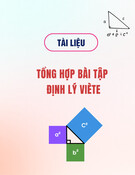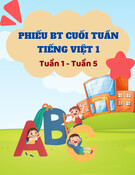
THCS DƯƠNG NỘI
ĐÊ CƯƠNG ÔN TÂP TIÊNG ANH 6 CUÔI KI II
NĂM HỌC 2022-2023
New words Transcription Meaning
adventure /ədˈven.tʃər/ (n) cuộc phiêu lưu
announce /əˈnaʊns/ (v) thông báo
audience /ˈɔː.di.əns/ (n) khán giả
cartoon /kɑːˈtuːn/ (n) phim hoạt hình
channel /ˈtʃæn.əl/ (n) kênh (truyền hình)
character /ˈkær.ɪk.tər/ (n) nhân vật
clumsy /ˈklʌm.zi/ (adj) vụng về
comedy /ˈkɒm.ə.di/ (n) phim hài
cool /kuːl/ (adj) dễ thương
cute /kjuːt/ (adj) xinh xắn
documentary /ˌdɒk.jʊˈmen.tər.i/ (n) phim tài liệu
educate /ˈed.jʊ.keɪt/ (v) giáo dục
educational /ˌed.jʊˈkeɪ.ʃən.əl/ (adj) mang tính giáo dục
entertain /en.təˈteɪn/ (v) giải trí
event /ɪˈvent/ (n) sự kiện
fact /fækt/ (n) thực tế, sự thật hiển nhiên
fair /feər/ (n) hội chợ, chợ phiên
funny /ˈfʌn.i/ (adj) hài hước
game show /ˈgeɪm ʃəʊ/ (n) buổi truyền hình giải trí
human /ˈhjuː.mən/ (adj) thuộc về con người
local /ˈləʊ.kəl/ (adj) mang tính địa phương
main /meɪn/ (adj) chính yếu, chủ đạo
manner /ˈmæn.ər/ (n) tác phong, phong cách
MC /ˌemˈsiː/ (n) người dẫn chương trình
musical /ˈmjuː.zɪ.kəl/ (n) buổi biểu diễn văn nghệ
national /ˈnæʃ.ən.əl/ (adj) thuộc về quốc gia
newsreader /njuːzˈriː.dər/ (n) người đọc bản tin trên đài,truyền hình
pig racing /pɪg ˈreɪ.sɪŋ/ (n) đua lợn
programme /ˈprəʊ.græm/ (n) chương trình
reason /ˈriː.zən/ (n) nguyên nhân
remote control /rɪˈməʊt kənˈtrəʊl/ (n) điều khiển (TV) từ xa
reporter /rɪˈpɔː.tər/ (n) phóng viên
schedule /ˈʃed.juːl/ (n) chương trình, lịch trình
series /ˈsɪə.riːz/ (n) phim dài kì trên truyền hình
stupid /ˈstjuː.pɪd / (adj) đần độn, ngớ ngẩn
universe /ˈjuː.ni.vɜːs/ (n) vũ trụ
viewer /ˈvjuː.ər/ (n) người xem (TV)
weatherman /ˈweð.ə.mæn/ (n) người thông báo tin thời tiết trên đài hoặc TV

I. Wh-question words (Từ để hỏi)
Công thức
Với động từ thường Question word + auxiliary + subject + verb...?
E.g:What do you eat? (Bạn ăn gì?)
Với động từ be Question word + be + subject...?
E.g:Where is Peter? (Peter đầu rồi?)
Cách dùng
Từ hỏi Mục đích
Who Dùng để hỏi về người.
Whose Dùng để hỏi về chủ sở hữu.
Where Dùng để hỏi vị trí và địa điểm.
When Dùng để hỏi về thời gian.
Why Dùng để hỏi nguyên nhân và tìm lí do.
What Dùng để hỏi về sự vật, việc điều chưa biết.
Which Dùng để hỏi về sự lựa chọn.
How Dùng để hỏi cách thức, tình trạng.
Một số ví dụ cơ bản
Who do you like? (Bạn thích ai?)
Whose car is this? (Chiếc xe này của ai?)
Where is the bus stop? (Trạm xe buýt ở đâu?)
When is his birthday? (Sinh nhật của anh ấy là khi nào?)
Why does he have bad marks? (Tại sao anh ấy bị điểm thấp?)
What do they talk? (Họ nói gì?)
Which drink do you order, coffee or milk tea? (Bạn gọi thức uống nào, cà phê hay trà sữa?)
How is your homework? (Bài tập về nhà của bạn thế nào?)
- Với how ta có thêm dạng câu hỏi khi đi với tính từ hoặc trạng từ
How + adj/adv...
How much : để hỏi số lượng, dùng cho danh từ không đếm được
E.g: How much time do you spend on English every day?
(Bạn dành bao nhiêu thời gian cho môn tiếng Anh hằng ngày?)
How many : để hỏi số lượng, dùng cho danh từ đếm được
E.g: How many brothers and sisters do you have? (Bạn có bao nhiêu anh chị em?)
How often : để hỏi về sự thường xuyên
E.g: How often do you visit your grandparents? (Bao lâu bạn mới đi thăm ông bà?)
How far : để hỏi về khoảng cách
E.g: How far is the school from your house? (Trường học cách nhà bạn bao xa?)
How long : để hỏi về khoảng thời gian
E.g: How long does this TV program me last? (Chương trình ti vi này kéo dài bao lâu?)
II. Conjunctions (Liên từ)
Liên từ Cách dùng
and Dùng để thêm thông tin vào câu nói.
E.g: My brother and I play football.
but Dùng để nêu lên hai thông tin đối ngược nhau.
E.g: She wants good marks, but she doesn't study hard.
so Dùng để chỉ kết quả, hệ quả, phía trước so luôn có dấu phẩy.
E.g: It's raining, so I'll stay at home.

I. Consonant /θ/(Phụ âm /θ/)
“th” được phát âm là /θ/
+ Khi nó đứng đầu, giữa hay cuối từ
Examples Transcription Meaning
think /θɪŋk/ nghĩ, suy nghĩ
thing /θɪŋ/ đồ vật
+ Khi “th” được thêm vào một tính từ để chuyển thành danh từ
Examples Transcription Meaning
width /wɪtθ/ bề rộng
depth /depθ/ độ sâu
+ Khi “th” chỉ số thứ tự
Examples Transcription Meaning
fourth /fɔːθ/ số thứ 4
fifth /fɪfθ/ số thứ 5
II. Consonant /ð/(Phụ âm /ð/)
“th” được phát âm là /ð/
Examples Transcription Meaning
they /ðeɪ/ họ
father /ˈfɑːðə(r)/ bố, cha
New words Transcription Meaning
athlete /ˈæθ.liːt/ (n) vận động viên
basketball /ˈbɑː.skɪt.bɔːl/ (n) môn bóng rổ
boat /bəʊt/ (n) con thuyền
career /kəˈrɪər/ (n) nghề nghiệp, sự nghiệp
congratulation /kənˌgræt.jʊˈleɪ.ʃən/ (n) sự chúc mừng
elect /ɪˈlekt/ (v) lựa chọn, bầu chọn
equipment /ɪˈkwɪp.mənt/ (n) thiết bị, dụng cụ
exhausted /ɪgˈzɔː.stɪd/ (adj) mệt nhoài, mệt lử
fantastic /fænˈtæs.tɪk/ (adj) tuyệt diệu
fit /fɪt/ (adj) mạnh khoẻ
goggles /ˈgɒg.l yz/ (n) kính (để bơi)
gym /dʒɪm/ (n) trung tâm thể dục
last /lɑːst/ (v) kéo dài
marathon /ˈmær.ə.θən/ (n) cuộc đua ma-ra-tông

racket /ˈræk.ɪt/ (n) cái vợt (cầu lông …)
regard /rɪˈgɑːd/ (v) coi là
ring /rɪŋ/ (n) sàn đấu (boxing)
skateboard /ˈskeɪt.bɔːd/ (n, v) ván trượt, trượt ván
ski /skiː/ (v, n) trượt tuyết, ván trượt tuyết
skiing /ˈskiː.ɪŋ/ (n) môn trượt tuyết
sports competition /spɔːtsˌkɒm.pəˈtɪʃ.ən/ cuộc đua thể thao
sporty /ˈspɔː.ti/ (adj) khoẻ mạnh, dáng thể thao
volleyball /ˈvɒl.i.bɔːl/ (n) môn bóng chuyền
I. Past simple (Thì quá khứ đơn)
1. Cách dùng
- Thì quá khứ đơn được dùng để diễn tả một hành động đã xảy ra và kết thúc trong quá khứ.
2. Dạng thức của thì quá khứ đơn
Công thức thì quá khứ đơn với động từ to be
Thể khẳng định (Positive form)
I / She/ He / It + was
We / You / They + were
Ví dụ: She was in the office an hour ago. (Cô ấy ở trong văng phòng cách đây một tiếng)
Thể phủ định (Negative form)
I / She/ He / It + was not
We / You / They + were not
Ví dụ: They weren’t at home yesterday. (Họ không ở nhà hôm qua.)
Thể nghi vấn (Question form)
Was + I / she/ he / it …?
Were + we / you / they …?
Trả lời:
Yes, I / she/ he / it + was No, I / she/ he / it + wasn’t
Yes, we / you / they + were No, we / you / they + weren’t
Ví dụ: Were they in the room ten minutes ago?
(Họ ở trong phòng bạn cách đây mười phút phải không?)
Yes, they were / No, they weren’t
(Vâng, đúng rồi / Không , không phải)
Công thức thì quá khứ đơn với động từ thường
Thể khẳng định (Positive form)
I / She/ He / It / We / You / They + V2/ed
Ví dụ: She visited an old friend last Sunday.
(Cô ấy thăm một người bạn cũ vào Chủ Nhật tuần trước.)
Quy tắc thêm “ed”
- Thông thường ta thêm “ed” vào sau động từ.
walk → walked roll → rolled inform → informed
- Tận cùng của động từ là “e” ta chỉ cần thêm “d”
live → lived invite → invited share → shared
- Tận cùng của động từ là y:
Nếu trước y là một nguyên âm (a,e,i,o,u) ta thêm ed bình thường.
play → played stay → stayed delay → delayed
Nếu trước y là phụ âm ta đổi y thành i rồi thêm ed
study → studied satisfy → satisfied reply → replied

- Nếu động từ có một âm tiết, tận cùng là một phụ âm, trước phụ âm có một nguyên âm, ta nhân đôi
phụ âm cuối rồi thêm ed
stop → stopped plan → planned
Ngoại lệ:
travel → travelled prefer → preferred permit → permitted
Động từ bất quy tắc
come → came (đến)
drive → drove (lái)
go → went (đi)
know → knew (biết)
run → ran (chạy)
say → said (nói)
take → took (lấy)
Thể phủ định (Negative form)
I / She/ He / It / We / You / They + did not + V (nguyên thể )
Ví dụ: He didn’t come to the club last month.
(Tháng trước cậu ấy không đến câu lạc bộ.)
Thể nghi vấn (Question form)
Did + I / she/ he / it / we / you / they + V (nguyên thể)
Trả lời
Yes, I / she/ he / it / we / you / they + did
No, I / she/ he / it / we / you / they + didn’t
Ví dụ: Did he miss the bus yesterday? (Hôm qua cậu ấy nhỡ xe buýt phải không?)
Yes, he did / No, he didn’t (Vâng, đúng vậy / Không, không phải)
3. Dấu hiệu nhận biết
Trong câu sử dụng thì quá khứ thường có các trạng từ chỉ thời gian xác định trong quá khứ:
- yesterday (hôm qua)
- last night/ last week / last month / last year (tối qua/ tuần trước/ tháng trước/ năm ngoái)
- ago (cách đây): two hours ago (cách đây 2 giờ); two days ago (cách đây 2 ngày)
- in the past (trong quá khứ)
II. Imperatives (Thể mệnh lệnh)
Thể mệnh lệnh thường được dùng để đưa ra các mệnh lệnh, yêu cầu, đề nghị, …
Thể khẳng định (Positive form)
Trong câu khẳng định ( hoặc xác định) thì động từ đứng đầu câu, chủ ngữ You bị lược bỏ.
Ví dụ: Come here! (Đến đây!)
Be quiet! (Hãy yên lặng)
Thể phủ định (Negative form)
Trong câu phủ định ta chỉ cần thêm trợ động từ ở thể phủ định trước động từ.
Ví dụ: Don’t open the door! (Đừng mở cửa!)
Don’t hurry! (Đừng vội!)
I. Short vowel /e/(Nguyên âm ngắn /e/)
- “a” được phát âm là /e/
Examples Transcription Meaning
many /meni/ nhiều
anyone /eniwʌn / bất kỳ ai
- “e” phát âm là /e/ khi nó nằm trong những từ một âm tiết có tận cùng là một hay nhiều phụ âm
(trừ “r”)- air, are
Examples Transcription Meaning





![Bài tập so sánh hơn và so sánh nhất của tính từ [kèm đáp án/mới nhất]](https://cdn.tailieu.vn/images/document/thumbnail/2025/20250808/nhatlinhluong27@gmail.com/135x160/77671754900604.jpg)
![Tài liệu tham khảo Tiếng Anh lớp 8 [mới nhất/hay nhất/chuẩn nhất]](https://cdn.tailieu.vn/images/document/thumbnail/2025/20250806/anhvan.knndl.htc@gmail.com/135x160/54311754535084.jpg)




![Tài liệu Lý thuyết và Bài tập Tiếng Anh lớp 6 [Mới nhất]](https://cdn.tailieu.vn/images/document/thumbnail/2025/20250802/hoihoangdang@gmail.com/135x160/18041754292798.jpg)




